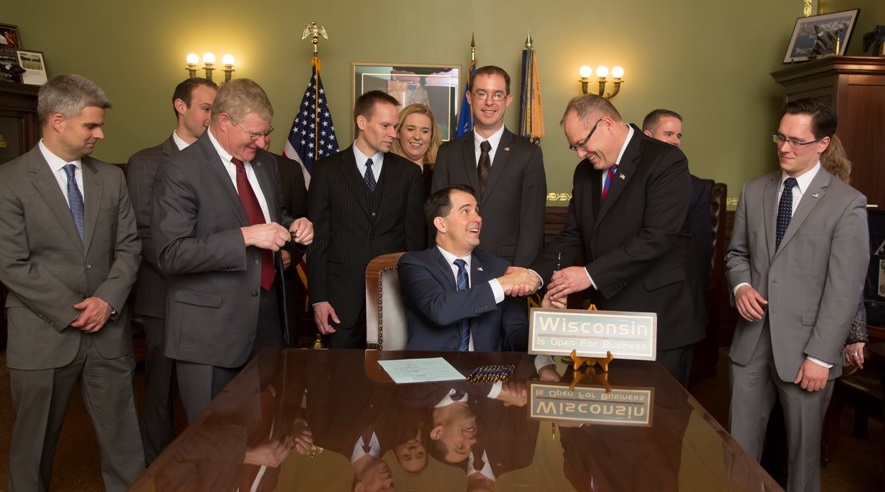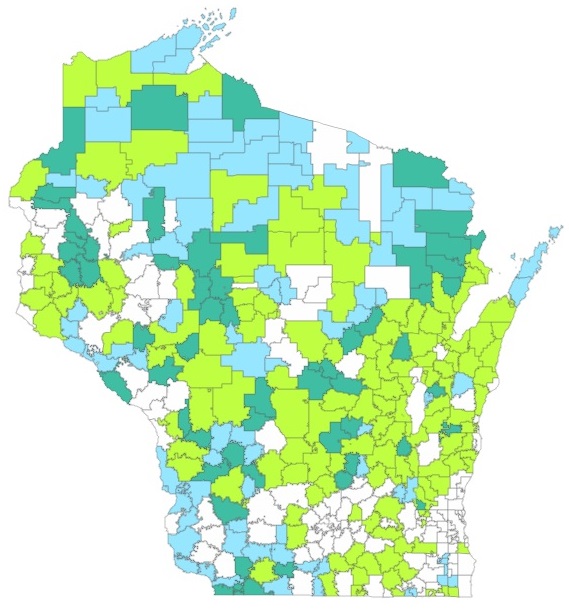|

Hardly three months ago, Congress passed
and President Donald Trump signed into law the Federal Tax Cuts and Jobs
Act of 2017. Regardless of whether you think that law was wise,
unwise or somewhere in the middle, its passage instantly created
dilemmas for states, many of whose state tax laws mirror but do not
automatically match the federal code.
With time running out in this spring's
legislative session, we had to hustle. Nonpartisan Legislative
Fiscal Bureau staff, Department of Revenue staff and many stakeholders
had to calculate the federal law's impact on countless state-level
provisions; only then could we legislators make value judgments about
what provisions to adopt on this short notice and what needed further
discussion.
In most respects, it made logical and
financial sense to change Wisconsin tax law to match the new federal
law. For example, if a person with student loan debt has his/her
loan forgiven because the student died or became permanently disabled,
the loan forgiveness will not be a taxable event at either the federal
or state level. We matched the new federal provisions for IRA
accounts, 529 savings accounts, tax-exempt charitable organizations and
more. We actually increased taxes (have you ever heard me
say that before?!) on our members of Congress by adopting the same new
federal provision that limits the deduction they can claim on their
travel to and from Washington.
So it was my distinct honor and privilege
to accept from Governor Scott Walker this week, with colleagues and
staff who also worked hard on this, the pen he used to sign Assembly
Bill (AB) 259 into law, formally enacting all these changes. When
you file your tax returns next spring for the 2018 tax year,
these changes will already be in effect; in almost every instance,
Wisconsin will treat all your money the same way the feds do.
As always, I encourage you to follow
my updates on
social media or contact
my office directly with your questions. Best wishes on your weekend!

Supporting Wisconsin's Children and Families
In a little more than a week, Governor
Walker has signed more than 100 bills into law. We're getting positive
things done for you! Highlights include:
Assembly
Bill (AB) 924 improves families' access to
high-quality child care. It uses federal funds to increase both the
rates and the quality incentive payments for four- and five-star child care
providers.
Senate Bill
(SB) 75 allows businesses to contribute to a
college savings account for an employee or his/her child.
AB 422
combines forces among the Department of
Workforce Development, Department of Veterans Affairs and the Department of
Children and Families to create a new transitional jobs program for
veterans. If a veteran has been unemployed for longer than four weeks
and is ineligible for Wisconsin Works (W-2), an employer who hires the
veteran may be eligible for reimbursement of a portion of the veteran's
wages.
SB 415
enables you to indicate on your driver's
license if you have a disability that is not readily apparent to others
(i.e., autism, deafness, etc.). That way, if the police pull you over,
the officer will know right away that you have a condition that, say,
interferes with your ability to communicate or comply. This is a great
way to defuse situations that might otherwise escalate, and it's also a way
to reduce the frequency of events that create distrust among communities and
law enforcement.
SB 408
strengthens the enforcement of existing laws
by clarifying that the "straw purchase" of a firearm (intentionally
transferring a firearm to someone who can't legally own one) or acting as a
"human holster" (intentionally carrying a firearm so that someone else who
can't legally possess one may access yours instead) are felony offenses.
A package
of 11 bills, all of which I coauthored, from
the bipartisan Speaker's Task Force on Foster Care to improve outcomes for
children (especially with our foster care system under stress due to the
opioid epidemic, which is causing significant increases in demand for
services).
AB 737
ensures that repeat domestic violence
offenders are subject to all of the penalties under Wisconsin law (even if
their prior offenses occurred in another state).
SB 84,
Wisconsin's very own "Right to Try" legislation,
gives terminally ill patients a path to
access experimental treatment options that haven't yet received federal
regulatory approval.
More
Dollars in Classrooms Than Ever Before!

You may have read in
my
previous newsletters a fact that might surprise you: the 2017-19 state
budget law delivered more actual dollars to K-12 classrooms than
ever before (despite the fact that
enrollment trends modestly downward). No gimmicks, no exceptions;
every Wisconsin school district is actually receiving an additional
$200
per pupil in 2017-18, which $200
is delivered again in 2018-19 along with another
$204
per pupil in 2018-19. In the real world, that means that a classroom
of 20 students will receive more than
$12,000 in new funding.
In addition, I coauthored a
bill this spring to provide more help for rural schools, which Governor Walker signed into law just a few weeks ago. Click on the map
above to check out the interactive tool. Basically, the lime-green
districts (including every school district but one in the Sheboygan area)
are historically low spenders who are newly eligible for one type of
adjustment; the light blue ones get new sparsity aid (due to their
relatively low student populations); and the dark teal-green districts are
eligible for both. This is a huge step to reducing disparity among our
school districts and giving every student the best chance to achieve!
In addition, just two weeks ago, the
state legislature passed (and Governor Walker signed into law) a new $100
million school safety program. Every Wisconsin school is eligible for
additional funding for building security upgrades; a new state Office of
School Safety will provide training opportunities and best practices; and
schools will be consulting with their local law enforcement agencies and
conducting on-site assessments.
And while I'm on the subject: the latest
National Education Association
data ranks Wisconsin teacher salaries as the 23rd-best in the nation at
just under $55,000/year. If 23rd out of 50 doesn't sound very
impressive at first, consider that Wisconsin's cost of living is markedly
less than the national average, and consider also that most of the states
who are higher on the list have markedly higher living costs... and that
ranking takes on greater meaning!
Let me be clear: teachers earn every penny of
their paychecks. Wisconsin has a long history of excellence in
education, directly due to the teachers who are so dedicated to helping each
pupil reach his or her potential. But, although you may have been told
that your state government has "devastated" education funding in recent
years, that simply isn't borne out by the facts.
These accomplishments are making Wisconsin an
ever better place to learn, live and grow for all who call our state home!
|

